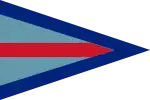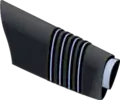| Group captain | |
|---|---|
 An RAF group captain's command flag | |
 A group captain's sleeve/shoulder insignia from the Royal Air Force | |
| Service branch | Air forces |
| Abbreviation | Gp Capt / GPCAPT |
| NATO rank code | OF-5 |
| Non-NATO rank | O-6 |
| Formation | 1 April 1918 (RAF) |
| Next higher rank | Air commodore |
| Next lower rank | Wing commander |
| Equivalent ranks | |
Group captain is a senior commissioned rank in the Royal Air Force, where it originated,[1] as well as the air forces of many countries that have historical British influence. It is sometimes used as the English translation of an equivalent rank in countries which have a non-British air force-specific rank structure. Group captain has a NATO rank code of OF-5, meaning that it ranks above wing commander and immediately below air commodore, and is the equivalent of the rank of captain in the navy and of the rank of colonel in other services.
It is usually abbreviated Gp Capt. In some air forces (such as the RAF, IAF and PAF), the abbreviation GPCAPT is used; in others (such as the RAAF and RNZAF), and in many historical contexts, the abbreviation G/C is used. The full phrase "group captain" is always used; the rank is never abbreviated to "captain".
RAF usage
- History
On 1 April 1918, the newly created RAF adopted its officer rank titles from the British Army, with Royal Naval Air Service captains and Royal Flying Corps colonels becoming colonels in the RAF. In response to the proposal that the RAF should use its own rank titles, it was suggested that the RAF might use the Royal Navy's officer ranks, with the word "air" inserted before the naval rank title. For example, the rank that later became group captain would have been "air captain". Although the Admiralty objected to this simple modification of their rank titles, it was agreed that the RAF might base many of its officer rank titles on naval officer ranks with differing pre-modifying terms. It was also suggested that RAF colonels might be entitled "bannerets" or "leaders". However, the rank title based on the Navy rank was preferred and as RAF colonels typically commanded groups the rank title group captain was chosen. The rank of group captain was introduced in August 1919[2] and has been used continuously since then.
Although in the early years of the RAF groups were normally commanded by group captains, by the mid-1920s they were usually commanded by an air officer.
In the post-World War II period the commander of an RAF flying station or a major ground training station has typically been a group captain. More recently, expeditionary air wings have also been commanded by group captains.
- Insignia and command pennant
The rank insignia is based on the four gold bands of captains in the Royal Navy, comprising four narrow light blue bands over slightly wider black bands. This is worn on both the lower sleeves of the tunic or on the shoulders of the flying suit or the casual uniform. Group captains are the first rank in the RAF hierarchy to wear gold braid on the peak of their cap, informally known as 'scrambled egg'; however, they still wear the standard RAF officer's cap badge.
The command pennant for a group captain is similar to the one for a wing commander except that there is one broad red band in the centre. Only the wing commander and group captain command pennants are triangular in shape.
 An RAF group captain's sleeve/shoulder insignia
An RAF group captain's sleeve/shoulder insignia An RAF group captain's sleeve mess insignia
An RAF group captain's sleeve mess insignia An RAF group captain's sleeve as it appears on the No. 1 dress
An RAF group captain's sleeve as it appears on the No. 1 dress
Other air forces
The rank of group captain is also used in a number of the air forces in the Commonwealth, including the Bangladesh Air Force,[3] Ghana Air Force,[4] Indian Air Force (IAF),[5] Namibian Air Force, Nigerian Air Force, Pakistan Air Force (PAF), Royal Australian Air Force (RAAF), Royal New Zealand Air Force (RNZAF), Sri Lankan Air Force and the Trinidad and Tobago Air Guard.[6] It is also used in the Egyptian Air Force, Hellenic Air Force, Royal Air Force of Oman, Royal Thai Air Force and the Air Force of Zimbabwe.[7]
The Royal Canadian Air Force used the rank until the unification of the Canadian Forces in 1968, when army-type rank titles were adopted. A Canadian group captain then became a colonel. In official French Canadian usage, a group captain's rank title was colonel d'aviation. In the Argentine Air Force comodoro (commodore) is the rank in Argentine Spanish while in the Chilean Air Force, the rank in Chilean Spanish is coronel de aviacion or "colonel of aviation". Until 1973 it was used by the Royal Malaysian Air Force (RMAF), beyond that the sleeve insignia is that of a full colonel.
 An RAAF group captain's sleeve/shoulder insignia
An RAAF group captain's sleeve/shoulder insignia A RNZAF group captain's sleeve/shoulder insignia
A RNZAF group captain's sleeve/shoulder insignia-2015.svg.png.webp) A RCAF colonel's sleeve/shoulder insignia, with rank braid in the traditional Commonwealth style
A RCAF colonel's sleeve/shoulder insignia, with rank braid in the traditional Commonwealth style A HAF sminarchos (group captain's) rank insignia
A HAF sminarchos (group captain's) rank insignia An Indian Air Force group captain's sleeve/shoulder insignia
An Indian Air Force group captain's sleeve/shoulder insignia A Namibian Air Force group captain's rank insignia
A Namibian Air Force group captain's rank insignia A PAF group-captain's rank insignia
A PAF group-captain's rank insignia.svg.png.webp) A RTAF group captain's rank insignia
A RTAF group captain's rank insignia airforce rank insignia
airforce rank insignia
Equivalent ranks in other services
In addition to the equivalents used in most air forces, such as colonel, other air services, especially non-combat auxiliaries in Commonwealth countries, have used a variety of alternative names for equivalent ranks.
The equivalent rank in the Women's Auxiliary Air Force, Women's Auxiliary Australian Air Force, Women's Royal Air Force (until 1968) and Princess Mary's Royal Air Force Nursing Service (until 1980) was "group officer".
The equivalent rank in the Royal Observer Corps (until 1995) was "observer captain", which had a similar rank insignia.
Notable group captains
- Sir Douglas Bader CBE, DSO & Bar, DFC & Bar, DL, FRAeS – World War II fighter pilot and double amputee
- Clive Robertson "Killer" Caldwell DSO, DFC & Bar, Cross of Valor (Poland) – Australia's highest-scoring fighter ace, also the highest-scoring P-40 pilot from any air force and the highest-scoring Allied pilot in North Africa. Became one of a small group of pilots throughout history to become an "ace in a day".
- Leonard Cheshire VC – World War II bomber pilot and charity worker
- Walter Churchill DSO, DFC – World War II ace fighter pilot, who also evaluated various makes of fighter aircraft for the RAF, and played a key role in getting Spitfire aircraft to the defence of Malta
- Hugh Dundas – World War II fighter pilot and the youngest person to hold this rank, aged 24 years
- Thomas Loel Guinness – World War II fighter pilot, politician and businessman
- Hamish Mahaddie DSO, DFC, AFC & Bar, FRAeS – Scotsman who flew in Bomber Command and became a key member of the Pathfinder Force as chief procurer of aircrew talent, often referred to as Don Bennett's "horse thief"
- Sailor Malan DSO & Bar, DFC & Bar – Royal Air Force flying ace who led No. 74 Squadron RAF during the Battle of Britain, authored the "Ten Simple Rules for Fighter Pilots" and under whose leadership No. 74 Squadron RAF changed outmoded RAF tactics and formations, changes later adopted by all of Fighter Command. In the 1969 cinema film Battle of Britain, the character of Squadron Leader Skipper played by Robert Shaw was based on Malan
- Herbert Massey – as a POW was Senior British Officer (SBO) at Stalag Luft III. He was portrayed in the movie The Great Escape (1963) as Group Captain Ramsey, and played by James Donald. Massey was crippled and walked with a stick, as did his character in the movie
- Virendera Singh Pathania, VrC, VM Indian Air force fighter pilot reputed for making first confirmed kill in aerial dogfight during Indo-Pakistani War of 1965.
- Percy Charles Pickard DSO & Two Bars, DFC – World War II bomber pilot and captain of "F for Freddie"
- Alan Rawlinson OBE, DFC & Bar, AFC, – Australian RAAF World War II fighter ace and later commissioned into RAF[8]
- Stanisław Skarżyński – World War II bomber pilot. Commanding Officer RAF Lindholme. Polish Air Force. Transatlantic World Record Holder. Awarded Blériot Medal 1936
- James Stagg – RAF meteorologist involved in the planning of the D-Day invasion
- Clare Stevenson Director WAAAF
- Peter Townsend – World War II pilot and suitor of Princess Margaret
Honorary
- Sally Bridgeland – Non executive director, adviser and trustee. Investment consultant, actuary, and former CEO of the BP Pension Fund
- Bruce Dickinson – Frontman of Iron Maiden. Honorary Gp. Capt. of 601 (County of London) Squadron RAF[9]
- Sir Christopher Andrew Hoy MBE – Honorary Gp. Capt. as former Ambassador to the Royal Air Force Air Cadets
- Sachin Tendulkar – Honorary Indian Air Force group captain for his achievements in cricket
- Carol Vorderman MBE – Honorary Gp. Capt. as current Ambassador to the Royal Air Force Air Cadets
Fictional characters
- Ian Gilmore, a fictional character in Doctor Who
- Group Captain Tennant James, a fictional character in Doctor Who
- Captain Jack Harkness, a fictional character in Doctor Who and its spin-off Torchwood
- Group Captain Lionel Mandrake, a fictional character in the film Dr. Strangelove, played by Peter Sellers
- Group Captain Rodney Crittendon, a fictional character in the television show Hogan's Heroes, played by Bernard Fox (Crittendon was titled on the show as the equivalent rank of colonel to avoid confusion with the American audience.)
See also
References
- ↑ "Ranks and Badges of the Royal Air Force". Royal Air Force. 2007. Archived from the original on 6 June 2011. Retrieved 1 December 2007.
- ↑ Hobart, Malcolm C (2000). Badges and Uniforms of the Royal Air Force. Leo Cooper. p. 26. ISBN 0-85052-739-2.
- ↑ "BAF RANKS". Bangladesh Air Force Website. BAF Communication Unit. 2020. Retrieved 13 December 2020.
- ↑ "Ghana Air Force Ranks » Ghana Insider". 8 December 2020.
- ↑ "Officer ranks in Indian Army, Air Force and Navy". India Today. New Delhi. 25 February 2019. Retrieved 19 December 2020.
- ↑ "Promotion and Appointment in the Trinidad and Tobago Defence Force (Air Guard)" (PDF). Trinidad and Tobago Gazette (Extraordinary). 53 (140). 2014. Retrieved 21 September 2022.
- ↑ "Ranks and Badges in the AFZ". Air Force of Zimbabwe Website. Air Force of Zimbabwe. 2020. Retrieved 13 December 2020.
- ↑ "Group Captain Alan Charles Rawlinson". Australian War Memorial. Retrieved 1 February 2023.
- ↑ "Iron Maiden Lead Singer Bruce Dickinson Made Honorary Group Captain in RAF".